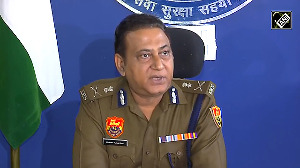Samsul, an Aceh national in Indonesia; Ngawang C Drakmargyapon, a Tibetan; and Soe Myint, a Burmese, have nothing in common but a bond of 'hope and optimism.'
In Mumbai for the World Social Forum meet, they are hopeful one day they will be citizens of a free country.
| |||||||||||
Dressed in a back T-shirt, Samsul cuts a lonely figure in the buzz of the WSF mela. He stands all day long on a chair holding a placard which reads -- 'Freedom for Aceh people from the Indonesian oppression.'
He is the only Aceh representative at the WSF.
The Indonesian province of Aceh, with a population of around 4.3 million, is located on the northern tip of the island of Sumatra, about 1,000 miles from Jakarta, the Indonesian capital.
The people of Aceh never accepted the legitimacy of the Indonesian rule since the latter's liberation from the Dutch rule in 1945.
"Revolutionaries have to be optimistic all the time. If I lose hope, my countrymen too lose hope. I am here to highlight Aceh problems to all the people assembled here. Even if I am not alive the struggle passes on to the next generation. Individuals don't matter when it comes to a fight for justice...the struggle matters and it goes on even if an individual is
there or not," Samsul said.
His friend Tomas Frietas, who is from East Timor, agrees. "Ten years ago when we used to talk abut freedom for East Timor from the Indonesian rule people thought we were joking. Nobody took us seriously. But you see we achieved our goals. I am therefore optimistic that Aceh people will also get independence from the Indonesian rule."
Not far from Tomas and Samsul is sitting Ngawang C Drakmargyapon, spokesman of the Tibetan delegation to WSF. "We have been optimistic for the last four decades that the Chinese will give us genuine self-rule. And you see, the world knows that the aggression of Chinese in our land was not correct. They have violated all the international norms and have taken our territory," he says.
Asked what made him come to the WSF and how does it benefit the Tibetan struggle, Ngawang says: "We are 350 people who have come here to highlight the problems of Tibetan people. At WSF you meet people from all over. They come to know about our woes and go back to their country and pressure their government to take action against the Chinese on Tibet issue."
When pointed out bluntly that the pressure has not yielded any results in over four decades now, Ngawang says: "You cannot talk of such issues in black and white. We all look for solutions to such complex problems. We want our fundamental rights and human rights to be respected. We want to be free from alien domination of our land."
But results are important, aren't they?
"If you notice in the recent years, the Chinese government has invited an envoy of His Holiness Dalai Lama [for discussions]. So things progress and one has to be optimistic always,"
Compared to Ngawang and Samsul, Soe Myint, a Burmese pro-democracy activist, is a shade short on patience. "It's a question of time before military establishment in Burma disappears," he says.
"The whole world knows the atrocities of the Burmese army. They have killed thousands of people since our struggle for democracy began. They have arrested our leader, Aung San Suu Kyi. We want the Indians to support our cause."
Asked how his pro-democracy movement will benefits from the WSF, "There are 35 people who have come from Burma. We have made friends all over the world by coming here, specially the Indians. We now want the Indians to be
with us and support our movement. We are hopeful that this summit will end up with a more concrete positive step in future that will result into the independence of our country."






 © 2025
© 2025